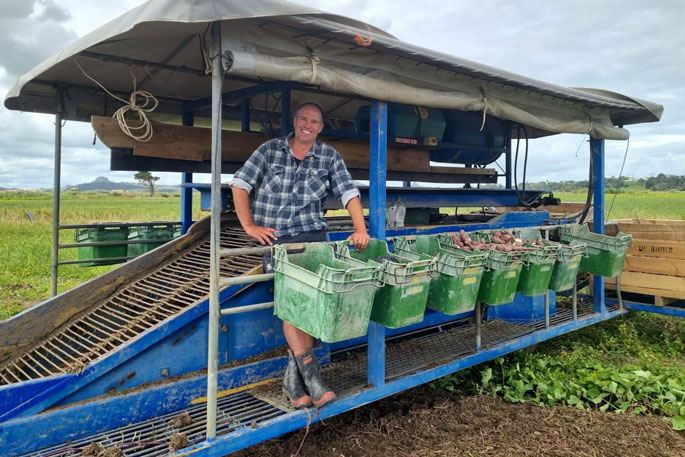Cash-strapped shoppers are giving up on buying fresh fruit, vegetables and meat, while parents struggle to afford healthy food to fill kindergarten and school lunchboxes.
Stats NZ figures released on Monday showed food prices jumped 12.1 percent in March compared to the same time last year - the biggest annual increase in more than 30 years.
Mother-of-two Jenna Berry says the "ridiculous" cost of fresh produce had forced her to make meal-time sacrifices so her children ate well.
"I'm a solo mum with two kids and I struggle. I actually cut my meal size down so they get decent meals."
Jenna says she makes savings by buying meat in bulk, shopping at local fruit and vegetables stores and eating home-grown produce, but it's becoming increasingly difficult to pack healthy lunches for her children.
"My kids' kindergarten, the school, they're really strict on the food you can put in their lunchboxes, but the food they want us to put in is so expensive you tend to go for your cheap, crap foods, sugary stuff like that because it is cheaper.
"They will literally turn around and tell the kids, you can't eat that at kindy, it's a home treat. Then I've got my kids who come home starving because they're not allowed to eat that food at kindy."
The Stats NZ Food Price Index shows grocery food prices shot up 14 per cent year on year, driven by prices for eggs, potato chips and yoghurt six-packs.
Fruit and vegetable prices soared by 22 per cent, driven by tomatoes, potatoes and avocados.
Shopper Olivia Bovey says grocery price hikes means she and her partner can not afford to eat fresh fruit and vegetables.
"We have to get frozen food, or we just eat fatty food. I love fresh veges, but I just can't afford them. They really need to put prices down on veges, it's crazy.
"Sometimes I have to go to the food bank because I can't afford to go to the supermarket."
Olivia says she only eats meat when she wins $50 packs in Thursday night pub raffles and takeaways are sometimes cheaper than cooking at home.
Many argue supermarket profiteering is driving food price rises while others point to suppliers' increased production costs and bad weather ruining crops.
Cyclone Gabrielle's devastation has resulted in short supply and high prices for kūmara, which costs about $11 per kilogram - more than double the price this time last year.
 Andre de Bruin says this year's harvest is a salvage job. Photo: RNZ / Sam Olley.
Andre de Bruin says this year's harvest is a salvage job. Photo: RNZ / Sam Olley.Dargaville kūmara grower Andre de Bruin spoke to RNZ from the middle of harvesting a paddock with underground flood-damage.
"Somewhere between 20 to 25 per cent of our normal tonnage will be coming off that particular paddock. Each paddock we're going to varies, but we've had nothing so far that's any more than about 30 per cent.
"This is not a normal harvest. I would call this a salvage job."
Andre says it's unclear how how much kūmara will handle winter storage because some of the crop can rot.
Kūmara will be thin on the ground until next February, he says.
"The price going up is a reflection that there is scarcity. Although we have really tried to produce as much as we can for the consumer, what's there really is what's there. We can't manufacture what we don't have."
United Fresh president Jerry Prendergast says some vegetables are getting cheaper, like cauliflower, which has almost halved in price to about $5 per head.
"I respect the fact that perhaps even $5 is not suitable for some people - some people will pay $5 for a cup of coffee, so it's kind of relevant.
"If you look at the value per gram it's reasonable. The days of the $2 and $3 cauliflower have gone, the $5 cauliflower is the future."
Jerry says growers are still battling high fuel and fertiliser costs and labour shortages and could not avoid passing some of that expense on to consumers.
"Demand and supply principles apply with produce. If demand is there and the supply is short, then the produce price will increase.
"Will it turn people off in the future? I just plead with the consumers of New Zealand to be really flexible - don't buy it if it's too dear. There is still some really good buying out there if you're prepared to be reasonably flexible."
Foodstuffs says it has to pay suppliers 10.3 per cent more in March than it did the year before for groceries, according to information it supplies to economics consultancy Infometrics.
Foodstuffs North Island managing director Chris Quin told Morning Report the company has held price increases to customers below the food price index and supplier cost increases in March.
"We saw the product cost to us go up about 12.8 per cent. We managed to work hard on seeing what we could do around specials and reducing our costs and getting retail prices not to flow all of that through. We got about a 9.5 percent increase."
Chris says Foodstuffs has noticed shoppers switching to chilled and frozen products and research shows about 44 per cent of customers are hunting for cheaper brands.
In its final report into the $22 billion grocery industry released in March 2022, the Commerce Commission estimated Foodstuffs and Countdown are making $430 million a day in excess profits - a figure disputed by the duopoly.
The Grocery Industry Competition Bill currently before the Parliament includes a new code of conduct for dealings with suppliers and a requirement for the big chains to wholesale products to rivals, along with establishing a grocery commissioner.
A Countdown spokesperson was unavailable for comment.



3 comments
Pub
Posted on 20-04-2023 23:48 | By RhysM
Meat packs from the pub. Poor budgeting skills and poor spending judgement. This could be part of the problem.
Its not the cyclone
Posted on 21-04-2023 09:26 | By an_alias
Come on, thats pathetic. You think the price of food across the board is dictated by Kumera. You destroy the fuel and help create shortages across the board....there is a flow on effect. Govt is the problem, they also allowed the 2 food companies
Consumer resistance...
Posted on 21-04-2023 10:44 | By morepork
... is a good move. I won't, on principle, pay $2.50 for an avocado, even though they are a fantastic food. Growers need to make a living and have my sympathy. When we see Supermarkets turning profits over a billion dollars then it is obvious where the money's going. I don't like government meddling in commerce, but there is a very good case here, after the devastation from the cyclone, for prices on fresh food to be controlled until crops can be recovered. And a Kindergarten telling a kid they can't eat a candy bar, is too much. They should have explained that candy bars are not OK in the kindy, and given a letter for the parents, but let the child have the bar, rather than go hungry. Sometimes we just follow the rules and miss the bigger picture. Hungry kids can NEVER be OK.
Leave a Comment
You must be logged in to make a comment.